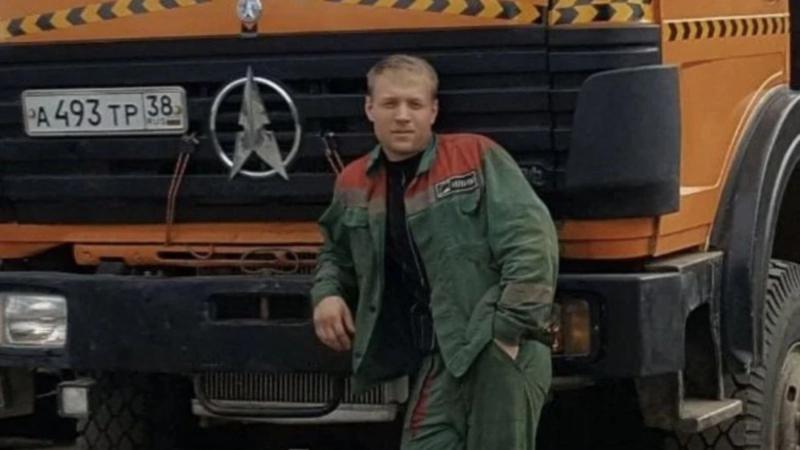
Ruslan Zinin, a second-generation timber truck driver from Ust-Ilimsk in the Irkutsk region. Shortly after President Putin announced mobilisation in September 2022, Ruslan’s cousin received a summons to report to the military recruitment office, from where he would likely be sent to war. To Ruslan, this summons felt like a death sentence for his cousin, and he resolved to protect him at any cost.
Ruslan devised a plan: to distract the recruitment office staff from processing conscripts and disrupt the mobilisation process by causing a commotion. However, events took a far more tragic turn. While listening to the head of the recruitment office, Alexander Eliseev, respond dismissively to conscripts’ questions, Ruslan was stunned by the man’s disdainful attitude. He fired several shots at Eliseev, inflicting non-fatal injuries.
Ruslan was subsequently arrested, charged with “terrorism,” and sentenced to 20 years in prison.
A Second-Generation Timber Truck Driver
Ruslan Zinin was born and raised in Ust-Ilimsk, a small industrial town in the Irkutsk region.
“The daily life was typical of a small monotown, apart from work. A bleak, provincial place at its worst, where survival and protecting loved ones were the main concerns — and that’s what most people focused on,” Ruslan once said about life in his hometown.
Ruslan came from a family of timber truck drivers. From a young age, his father would take him along on trips, and as Ruslan grew up, he followed in his father’s footsteps, continuing the family tradition. He genuinely loved his work and even maintained a modest blog on Telegram, where he shared stories from his day-to-day life on the job.
“My father often took me along on his trips. I wasn’t even in primary school yet, but I was already spending days on end in the taiga with him. Back then, it was normal to bring your sons along. Once I finished school, I started from the bottom: working as a mechanic, servicing and repairing heavy machinery and timber trucks. <…>
By the time I was 20, I was driving timber loads. I celebrated my 21st birthday on the road — and my 22nd, 23rd, and 25th. (I missed my 24th because I was stuck doing repairs, breaking a good tradition.) I’ve hauled cargo almost everywhere and seen all sorts of things. In recent months, I’d been working on a converted timber truck, transporting supplies and cabins to crews involved in forest restoration. In short, I’ve helped with cutting, planting, and building.”
By the time of his arrest, Ruslan Zinin had been working as a timber truck driver for nearly five years. With each passing year, the working conditions and management’s attitude towards their employees only seemed to worsen.
“A few months before the start of the ‘special military operation,’ I lost my job. Small companies like mine began to go under because of the crisis in the industry, a sharp rise in spare parts prices, and, most importantly, the introduction of QR codes for timber products. That hit the forestry sector like a punch to the teeth, and many couldn’t recover. My company was one of those forced to shut down,” Ruslan wrote in a letter.
Ruslan also struggled to find work with larger timber transport companies in Ust-Ilimsk because he didn’t have a military ID, which was required for employment. According to his father, Ruslan spent seven years trying to obtain his military ID from the Ust-Ilimsk recruitment office. Each time, they sent him to Irkutsk for medical examinations, but the trips yielded no results.
In November 2021, while on a haul, Ruslan’s timber truck tipped onto its side. Though he was unharmed, the vehicle sustained damage. It turned out the truck wasn’t insured by the transport company, and the full cost of repairs was placed on Ruslan. He managed to fix the truck but resigned shortly after.
His mother, Marina, shared that Ruslan became deeply depressed after this incident, worried he wouldn’t be able to find stable work. Shortly after Ruslan left his job, Putin launched the full-scale war against Ukraine.
On the day Putin announced live on television the recognition of the so-called “DPR” and “LPR” — the Russian-occupied territories of Ukraine’s Donetsk and Luhansk regions — Ruslan was preparing for a scheduled eye surgery. As he listened to Putin’s speech, he immediately realised where things were headed. During the three months of recovery after his operation, Ruslan stayed home, “helplessly watching events unfold.”
“I watched as, back in March, six coffins of young men were brought to Ust-Ilimsk. Four of them were conscripts. I knew one of them personally and saw his post-mortem photograph. The shock I felt was as intense as later, when his mother had to bring his body back herself, at her own expense — no one could even locate him at first.
The farewell took place in the town square. There, Alexander Eliseev [the head of the recruitment office] was present, running around shouting at people not to film because ‘everything is classified, and you’ll get in trouble.’ He never once apologised to the grieving mother — what a ‘hero.’ Worse still, the lad had become a contract soldier after only three months of service. He was just 18 years old. I still believe they killed him and then laughed in his mother’s face.
I became fully convinced of this later, during that infamous lecture before the shooting. That Jesuit-like cynicism was the reason for what happened — it was one of the key factors.”
“We will all go home now!”
On 25 September 2022, four days after mobilisation was announced, Ruslan Zinin met his friend Leonid Kudrov, who invited him for a drink. Ruslan later admitted he rarely drank alcohol, but that day, he didn’t decline. The two decided to meet at a mutual friend’s place. At a shop nearby, they bought two bottles of vodka, which they shared until the evening. Ruslan left the gathering around eight o’clock, heavily intoxicated, and decided to walk home, hoping to sober up along the way.
At the time, he was living with his grandmother, Nina Grigoryevna Lebedeva, as he could no longer afford to rent his own flat. The walk to her home took about an hour.
“When I got home, my grandmother met me in tears,” Ruslan later recalled.
She told him that his 22-year-old cousin, Vasily Gurov, had received a summons to appear at the military recruitment office the next day. Vasily had only recently completed his compulsory military service.
Ruslan recalled that a week before the incident, he and Gurov had discussed the latter’s unwillingness to take part in military operations. Although Ruslan wasn’t certain about his cousin’s current feelings on mobilisation, he assumed Gurov’s stance hadn’t changed and that he still didn’t want to join the army. Upon hearing about the summons, Ruslan became enraged and resolved to save his cousin from conscription at any cost.
“I reasonably saw the summons as a death sentence for my cousin,” Ruslan later wrote in a letter.
Telling his grandmother that Gurov would not go to serve, Ruslan left the apartment and headed to a garage cooperative where he had hidden a sawn-off shotgun. A plan began to take shape in his mind: the next morning, he would go to the recruitment office and persuade Gurov not to accept mobilisation. If his cousin agreed, Ruslan would leave quietly. But if Gurov refused, Ruslan intended to fire shots into the air to cause a disturbance, delaying Gurov’s processing while officials dealt with the chaos.
“At the time, I thought that within a couple of weeks, they’d stop mobilising people indiscriminately, regardless of their fitness categories,” Ruslan later told investigators during an interrogation.
Leaving the garages with the sawn-off shotgun hidden in his backpack, Ruslan headed to his car, which was parked near the house where he’d been drinking with friends the previous evening. He slept in the car, and upon waking in the morning, his first move was to call Gurov. When his cousin didn’t answer, Ruslan rang Svetlana Zobnina, Gurov’s mother, urging her not to let her son go to war.
Svetlana responded that avoiding the draft could lead to imprisonment. She had already packed her son’s bag and was preparing to go to his rented apartment, where Gurov and his friends had held a farewell gathering the night before. Gurov was due to report to the recruitment office by 3 p.m.
Ruslan tried calling Gurov several more times but couldn’t reach him. Resolving to act, he headed to the recruitment office. Along with the shotgun, he added a bottle of a mixture of oil and petrol to his backpack.
Around noon, Ruslan entered the recruitment office. Searching for Gurov, he went up to the second floor, where about 20 people summoned for mobilisation had gathered. Gurov wasn’t among them.
A few minutes later, the head of the recruitment office, Alexander Eliseev, came out to address the conscripts and invited them to an assembly hall to answer their questions about the mobilisation process. Ruslan followed him into the hall.
In the hall, Eliseev took the stage, standing behind a lectern, and began speaking about his own military service.
“Eliseev started giving a speech about his personal achievements without addressing the pressing questions about mobilisation. Because of this, some people got up and left, freeing seats in the left row near the wall, closer to the platform where Eliseev was standing. I moved closer, shifting a few seats toward the platform so he could see and hear me better. I placed my backpack with the shotgun next to me,” Ruslan recounted during his interrogation.
The conscripts and their relatives continued to ask Eliseev questions, but he ignored them, instead talking about the importance of military duty. Someone in the audience asked how they were supposed to manage their loans, mortgages, and childcare. According to Ruslan, Eliseev responded by saying it was their own fault for “taking out so many loans” and “having so many children,” adding that the recruitment office had nothing to do with their problems.
Ruslan was struck by the indifference of Eliseev’s reaction to issues that clearly mattered deeply to the people present. Quietly, he unzipped his backpack, loaded a cartridge into the shotgun without removing it from the backpack, and waited.
What happened next unfolded rapidly. A man in the audience asked, “Where will we be sent?” At that moment, Zinin pulled the shotgun from his backpack, stood abruptly, and shouted, “We will all go home now!”. He then leapt onto the stage and fired at Eliseev. The recruitment officer fell.
According to Ruslan, he had no intention of shooting anyone else in the hall. Turning to the audience, he yelled, “Everyone out!”. People panicked and began fleeing the assembly hall.
Ruslan fired two more shots “from the hip” at Eliseev. Without checking whether Eliseev was alive or dead, he poured the mixture of oil and petrol around the room and set it alight.
“I started the fire to ensure the fire brigade would arrive and everyone would evacuate the recruitment office, as I had planned beforehand. I didn’t intend to kill A.V. Eliseev with fire. I didn’t pour any liquid on him, approach him, or check if he was alive,” Ruslan stated in his interrogation transcript.
Zinin ran to the emergency exit, broke down the door, and descended the fire escape to the first floor. However, he found the grating at the bottom locked, preventing further escape. Realising he was trapped, Ruslan shouted that he was surrendering and asked for the police to be called.
The responding officers — Lieutenant Anatoly Stolyarov and Junior Lieutenant Vladimir Masloboev — ordered Ruslan to toss his weapon through the bars of the grate. Once he complied, they restrained him with a belt from his trousers. Ruslan offered no resistance during the arrest.
At 3 p.m., Gurov’s mother, Svetlana, brought him to the recruitment office. He went to report his attendance but was immediately detained by the authorities and taken for questioning. Investigators from the Investigative Committee sought to determine whether Gurov was involved in the shooting. After the interrogation, he was released.
The following day, Gurov returned to the recruitment office. “They told him that the mobilisation quota had been met for now, but it wouldn’t be long before it resumed. ‘You know very well that the special military operation isn’t over yet. Any day now, they’ll take you,’” his mother recounted. She added that she wouldn’t hide her son from conscription and would let him go to war because, as she put it, “he is a citizen of the Russian Federation.”
What about recruitment officer?
Alexander Eliseev, the wounded recruitment officer, was hospitalised with multiple gunshot injuries. Initially treated at Ust-Ilimsk City Hospital, he was transferred the next day to the intensive care unit of Irkutsk Regional Hospital.
The injuries were not life-threatening. Eliseev recovered and was discharged from the hospital approximately six weeks later, in mid-November 2022.
“Opponent of the Special Military Operation”
Initially, Ruslan Zinin was charged with “attempting to take the life of a law enforcement officer” (Article 317 of the Russian Criminal Code) and sent to pre-trial detention. However, the charges were later reclassified to “committing a terrorist act” (Part 2, Clause “v,” Article 205 of the Criminal Code), with additional accusations of illegal possession and modification of a weapon (Part 1, Article 222, and Part 1, Article 223 of the Criminal Code).
For several days after his arrest, Ruslan was kept in shackles on both his hands and feet. “I was forced to relieve myself, eat, and sleep while shackled. My requests to stop this or remove the restraints were ignored by the staff,” he recounted.
Exhausted by this treatment, he was brought in for his first interrogation on 28 September. The investigator dictated Ruslan’s responses as he saw fit, resulting in discrepancies during a subsequent interrogation.
“The record did not reflect what I actually said. Moreover, after those two days <…>, I was forced to sign the interrogation protocol in the form drafted by the investigator, despite its inaccuracy. Additionally, my lawyer, [Sergey] Sizyh, did not intervene during the interrogation, did not speak to me, did not provide consultation, and did not voice any objections,” Zinin explained in court.
Organising the trial was no simple task. The case was handled by the 1st Eastern District Military Court in Khabarovsk, one of only four courts in Russia at the time dealing with “terrorism” cases. Meanwhile, Ruslan Zinin remained in a pre-trial detention centre in Irkutsk, and most of the witnesses were in Ust-Ilimsk. As a result, the substantive hearing of the case only began on 9 October 2023.
According to the prosecution, Zinin, described as an “opponent of the Special Military Operation,” acted in response to the news that his cousin, Vasily Gurov, had received a conscription summons. Allegedly, he sought to disrupt the “mobilisation activities” by going to the recruitment office on 26 September 2022. The prosecution argued that Ruslan had premeditated a plan to carry out “multiple gunshots” at the recruitment officer and set the office on fire.
Ruslan admits to shooting at the recruitment officer but denies that his actions constitute a “terrorist act.”
Solitary Confinement
After his charge was upgraded to “terrorism,” Ruslan Zinin was moved to a solitary confinement cell in the basement of the Irkutsk pre-trial detention centre (SIZO). He spent a week there before being returned to a general cell housing eight inmates.
In one of his letters, Zinin described the conditions in detention:
“I’m in jail, in a shared cell with eight people, 40 square metres including the toilet. The cell is damp, with mould creeping up the walls. We fight it as best we can with our own means. There’s heating, and the food is edible. Overall, survival is manageable; I’ve heard of worse places, so I can’t complain.
Before prison, I worked almost five years driving logging trucks. Every shift, I had to sleep in the cab, hugging the gear stick or curled up on the steering wheel. I’m no stranger to discomfort.
We eat at the same table and sleep under the same roof in the cell. It’s like prison life. Reminds me of a mobile work cabin, but without the vodka between shifts. (I don’t drink myself — I’ve seen enough.)
We’re all adults here, and the charges are serious. We don’t know much about each other. There’s not much interesting to say about them. Most of them need professional legal assistance.”
During the summer of 2024, Ruslan Zinin spent 48 consecutive days in solitary confinement, three times longer than legally permitted. The first 10 days were imposed after he allegedly refused to transfer to another cell. Coincidentally, this occurred on the day a scheduled visit with his mother was to take place. In protest, Zinin began a hunger strike the next day. Over the course of the strike, his health deteriorated significantly—he lost considerable weight, his skin turned yellow, and he required intravenous therapy.
An additional 15 days in solitary were added after Zinin attempted to harm himself by cutting his veins.
“The conditions were deplorable,” said his lawyer Olga Chernova. “Rats roamed the space, the lighting was dim, and the walls were covered in mold. Ruslan didn’t receive letters, and his mother, in turn, didn’t get any from him. The cell lacked hot water, and the windows could only be opened by a centimeter.”
Chernova emphasized the broader systemic issues: “We will demand compensation for moral damages and a review of the detention center’s conditions. For instance, inmates are often denied essential medical care.”
Such a Sentence – “Simply Destruction for a Person”
On January 19, 2024, the 1st Eastern District Military Court, during an off-site session in Irkutsk, sentenced Ruslan Zinin to 19 years of imprisonment. The prosecution had initially requested a 20-year sentence.
According to the court’s decision, Zinin was to serve the first 7 years in prison, with the remaining time in a high-security penal colony.
Following the sentencing, Irkutsk Regional Prosecutor’s Office representative O.V. Buraeva filed an appeal seeking to increase Zinin’s sentence to the full 20 years. Buraeva justified the appeal by citing aggravating circumstances that she claimed the court had overlooked, including: “The crime was committed against an individual in connection with their official duties” (clause “g” of part 1, article 63 of the Criminal Code of the Russian Federation), “Using a weapon” (clause “k” of part 1, article 63), and “During a period of mobilization” (clause “l” of part 1, article 63).
At the same time, Ruslan Zinin, along with his defense attorney Marina Gan, also appealed the sentence. Additionally, Zinin submitted a petition to review the case materials once again.
On March 15, 2024, Ruslan Zinin was transferred to Pretrial Detention Center No. 1 in Khabarovsk to review the case materials in preparation for his appeal. Two weeks later, Judge Valery Andrusov limited the time allotted for this review to May 8. The investigative portion of the case alone comprised 11 volumes, each 200 pages long. Zinin’s defense attorney filed an appeal against this unjust decision. Before the appeal was considered, Zinin was transferred back to Pretrial Detention Center No. 1 in Irkutsk.
In early June, Ruslan Zinin’s case reached the Military Appeals Court.
On July 30, the appellate panel, consisting of Presiding Judge Oleg Egorov and Judges Lyudmila Tarlavina and Maxim Panin, upheld prosecutor Buraeva’s complaint and increased Zinin’s sentence by one year.
As a result, Ruslan was sentenced to 20 years of imprisonment, of which he is to serve 7 years in a maximum-security prison (“krytaya” prison) and the remainder in a high-security penal colony.
During the closing arguments, Ruslan stated that such a sentence was “simply destruction for a person.” сDespite this, he said he felt well and sent a message to his mother before the hearing, asking her not to worry about him.
A Tragic Chain of Circumstances
While in detention, Ruslan Zinin wrote an open letter recounting the events of September 26 and the reasons behind his actions:
“That day [September 26], I truly went to the enlistment office with the firm belief that I could prevent my younger brother from being mobilized, following the summons he had received for the same day. Until the last moment, I was absolutely convinced that I wouldn’t harm anyone. I have been categorically opposed to violence since childhood, and anyone who knows me well can attest to this.
I also must admit that to this day, I am haunted by nightmares of a posthumous photograph of my school friend, an 18-year-old boy who was conscripted in November 2021 and died in March 2022 during the first days of the ‘Special Military Operation’ . The mere thought of ever seeing my own loved one like that — God forbid — made me realize that I couldn’t go on living knowing I hadn’t done anything to prevent it. I was ready to throw myself under a tank with my bare hands for any of my brothers. I have three of them. Just to keep from seeing the grief and tears of their loved ones.
The summons was issued to the youngest of my brothers, who had only recently returned from military service. I knew he was a military driver, as am I by trade, and I was absolutely certain that military drivers are sent on suicide missions. When I saw my grandmother at home in tears, saying that my brother was leaving for war the next day, I didn’t hesitate for a second. My family outright rejected my protests, insisting that prison was the only alternative. They were frightened. At that moment, I realized I could only rely on myself.
Everything happened so fast that I failed to ensure the safety of both myself and others from unforeseen circumstances. Everything that happened at the enlistment office, I consider the result of my fatal mistakes and a tragic coincidence.”
As of October 9, 2024, Ruslan Zinin is serving his sentence at the Yeniseysk prison in the Krasnoyarsk region, Russia’s northernmost high-security “clink”. According to the court’s ruling, he will remain there until 2030, after which he will be transferred to less severe conditions in a strict-regime penal colony.
Related Publications (in Russian)
The Insider
DOXA
SibReal
MediaZona
HOW TO HELP
Address for letters and parcels:
663180, Krasnoyarsk Krai, Yeniseisk, 11 Dekabristov Street, FKU T-2 GUFSIN of Russia for Krasnoyarsk Krai
Zinin Ruslan Alexandrovich, born in 1997
It is possible to send letters through the electronic service «ФСИН-письмо», «Зонателеком», PrisonMail.Online.
How can I write letters to political prisoners in Russia?



